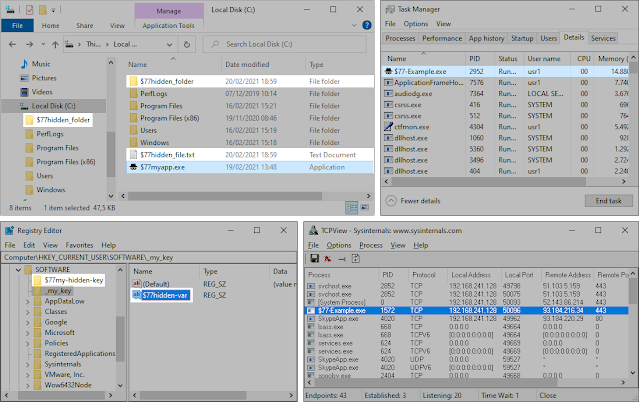Ring 3 rootkit
r77 is a ring 3 Rootkit that hides following entities from all processes:
- Files, directories, junctions, named pipes, scheduled tasks
- Processes
- CPU usage
- Registry keys & values
- Services
- TCP & UDP connections
It is compatible with Windows 7 and Windows 10 in both x64 and x86 editions.
Hiding by prefix
All entities where the name starts with "$77" are hidden.
Configuration System
The dynamic configuration system allows to hide processes by PID and by name, file system items by full path, TCP & UDP connections of specific ports, etc.
The configuration is stored in HKEY_LOCAL_MACHINE\SOFTWARE\$77config and is writable by any process without elevated privileges. The DACL of this key is set to grant full access to any user.
The $77config key is hidden when RegEdit is injected with the rootkit.
Installer
r77 is deployable using a single file "Install.exe". It installs the r77 service that starts before the first user is logged on. This background process injects all currently running processes, as well as processes that spawn later. Two processes are needed to inject both 32-bit and 64-bit processes. Both processes are hidden by ID using the configuration system.
Uninstall.exe removes r77 from the system and gracefully detaches the rootkit from all processes.
Child process hooking
When a process creates a child process, the new process is injected before it can run any of its own instructions. The function NtResumeThread is always called when a new process is created. Therefore, it's a suitable target to hook. Because a 32-bit process can spawn a 64-bit child process and vice versa, the r77 service provides a named pipe to handle child process injection requests.
In addition, there is a periodic check every 100ms for new processes that might have been missed by child process hooking. This is necessary because some processes are protected and cannot be injected, such as services.exe.
In-memory injection
The rootkit DLL (r77-x86.dll and r77-x64.dll) can be injected into a process from memory and doesn't need to be stored on the disk. Reflective DLL injection is used to achieve this. The DLL provides an exported function that when called, loads all sections of the DLL, handles dependency loading and relocations, and finally calls DllMain.
Fileless persistence
The rootkit resides in the system memory and does not write any files to the disk. This is achieved in multiple stages.
Stage 1: The installer creates two scheduled tasks for the 32-bit and the 64-bit r77 service. A scheduled task does require a file, named $77svc32.job and $77svc64.job to be stored, which is the only exception to the fileless concept. However, scheduled tasks are also hidden by prefix once the rootkit is running.
The scheduled tasks start powershell.exe with following command line:
[Reflection.Assembly]::Load([Microsoft.Win32.Registry]::LocalMachine.OpenSubkey('SOFTWARE').GetValue('$77stager')).EntryPoint.Invoke($Null,$Null)
The command is inline and does not require a .ps1 script. Here, the .NET Framework capabilities of PowerShell are utilized in order to load a C# executable from the registry and execute it in memory. Because the command line has a maximum length of 260 (MAX_PATH), there is only enough room to perform a simple Assembly.Load().EntryPoint.Invoke().
Stage 2: The executed C# binary is the stager. It will create the r77 service processes using process hollowing. The r77 service is a native executable compiled in both 32-bit and 64-bit separately. The parent process is spoofed and set to winlogon.exe for additional obscurity. In addition, the two processes are hidden by ID and are not visible in the task manager.
No executables or DLL's are ever stored on the disk. The stager is stored in the registry and loads the r77 service executable from its resources.
The PowerShell and .NET dependencies are present in a fresh installation of Windows 7 and Windows 10. Please review the documentation for a complete description of the fileless initialization.
Hooking
Detours is used to hook several functions from ntdll.dll. These low-level syscall wrappers are called by any WinAPI or framework implementation.
- NtQuerySystemInformation
- NtResumeThread
- NtQueryDirectoryFile
- NtQueryDirectoryFileEx
- NtEnumerateKey
- NtEnumerateValueKey
- EnumServiceGroupW
- EnumServicesStatusExW
- NtDeviceIoControlFile
The only exception is advapi32.dll. Two functions are hooked to hide services. This is because the actual service enumeration happens in services.exe, which cannot be injected.
Test environment
The Test Console can be used to inject r77 to or detach r77 from individual processes.
Technical Documentation
Please read the technical documentation to get a comprehensive and full overview of r77 and its internals, and how to deploy and integrate it.
Project Page







